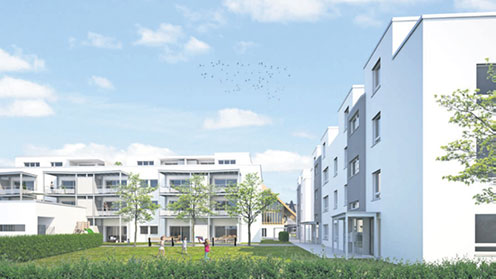Inspirational social care leader Zoë Fry has been awarded the Order of the British Empire (OBE) medal for services rendered to social…
ABB open API platform empowers elderly to lead independent and fulfilled lives with smart technology
In one of the first examples of its open API platform in practice, ABB has been working alongside the iHomeLab of the Lucerne University of Applied Sciences and Arts to pioneer a personalized virtual assistant to improve quality of life for elderly residents through the use of smart technology.
With increasing life expectancy, the number of seniors in the population will continue to grow. Consequently, solutions for Ambient Assisted Living (AAL) are becoming increasingly important to allow the elderly to live independently at home for longer.

The ‘My Life, My Way’ project is the first project of its kind to use ABB’s new open API platform to provide an alternative means of holistic care and virtual support for key aspects of social and clinical care provision within assisted living environments.
Designed to help large groups of residents live independently for longer, the project was implemented by iHomeLab and bonacasa Smart Living, together with a number of international partners. The project uses a virtual assistant, which supports assisted living in bonacasa apartments in Switzerland, implemented by the ABB-free@home® system.
Called Anne, the virtual assistant interacts with residents through voice control or a tablet.
The solution uses ABB-free@home® through its open API, MyBuilding portal and ABB Ability™ cloud-based platform to enable users to easily control all the functions of their smart apartment.
At IFA 2019, ABB launched its open API platform to completely transform the smart home sector and create new possibilities for developers and partners to integrate hundreds of apps and solutions such as this unique virtual assistant.
The ‘My Life My Way’ project is a powerful example of how ABB’s new open API platform enables greater third-party integration for the benefit of the end user. Through the API of ABB-free@home®, residents can ask the virtual assistant to access the Smart Home menu and easily control up to 15 functions in their apartment, from door automation to lights and video intercom.
The trial comes at a critical time in healthcare provisioning, when global health care spending is projected to increase at an annual rate of 4.1% in 2017-2021, up from just 1.3% in 2012-2016 *. Many clinicians and worldwide healthcare providers are turning to smart technology as a positive route to provide innovative, cost-effective ways to help reduce and relieve the pressure on personnel and financial resources in health trusts.
The key purpose of the trial with bonacasa Smart Living inhabitants in Switzerland was to check the acceptance of a virtual assistant with non-technically advanced people. User behavior was analyzed in detail and conclusions drawn, which were important for further development and commercialization of the project. The pilot also wanted to prove that the virtual assistant could really help residents to live in comfort and maintain daily routines in a healthy and supportive way.
Oliver Iltisberger, Managing Director of ABB’s Smart Buildings business, said: “We are now living in a world where rising health care costs and our ageing population is causing unprecedented challenges to the health care sector. Smart technology offers new and pioneering ways in which certain aspects of care can be automated, but also help people live better, safer and more comfortably in their own homes to reduce the pressure on support resources.”
![]()
“This trial is very exciting and demonstrates how easily smart technology can be adopted if it is integrated holistically into the living environment and can be personalized to the user through our open API platform.”
ABB-free@home® allows for easy control of home automation applications from a mobile device or PC. In this trial, residents used a tablet with the on-screen avatar, in addition to panels on the wall, to control and manage certain functions within the home including lights and blinds, HVAC (heating, ventilation, and air-conditioning) and the secure entry system.
Smart technology packaged into sleek, user friendly controls and used across personal devices such as phones, computers or tablets are removing the stigma associated with supported living devices. The avatar offered an easy-to-use, natural way to interact with smart technology while helping residents to have more control over their day to day lives.
Dr. Andrew Paice, Head of iHomeLab comments: “The aim of this pilot was to help elderly residents lead independent and fulfilled lives by blending people and technology. While the technology in the background is quite complex, for the end-users the virtual assistant is a friendly, human-looking avatar, which can be seen on the screen of their PC, TV, tablet or smart phone. Residents can speak to the virtual assistant using their native language. In a way, it’s like a modern version of a butler: someone that you can trust, who knows you very well, serves you as and acts in your interest when you need - either in the background or face to face.”
With rising loneliness and isolation also affecting a growing number of the elderly, the avatar project is seen to be having a positive impact on helping families and friends connect more regularly through digital with video calls and instant messaging.
Digital enablement in assisted living spaces ensure solutions can be easily integrated and combines smart home and healthcare technology into a single package of support and care.
From managing medication control, helping with diet through to alarm setting and reminders, along with providing independent living, security, communication and social entertainment through digital enablement, the avatar is becoming widely accepted with two out of three residents asking to keep the tablet after the trial.
Iltisberger from ABB continues: “We believe virtual assistants like this one can play a pivotal role in helping elderly residents and people with mobility issues, whether its programmed to support and maintain daily active lives or while in recovery.”
“With the launch of our new API platform we welcome any new advancements in the medical field and anticipate a huge increase in smart technologies for assisted living programs. At ABB we continue to work with our partners to invest in the advancement of smart home and building technology to support life cycle services for every stage of life.”
bonacasa in Switzerland is a unique housing concept featuring 1,000 owned and 7,500 B2B apartments all over Switzerland. Each apartment offers contemporary architecture within an integrated smart technology environment as well as personalized services. This provides a safer and more convenient lifestyle for active families and for those who are retired and or need a little extra care to live independently.





